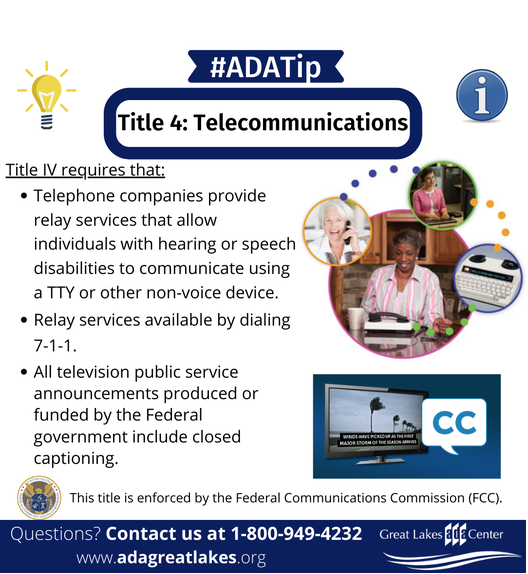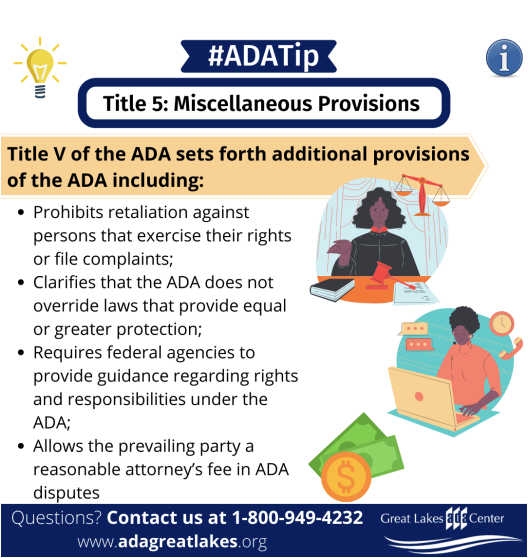
“Let the shameful wall of exclusion finally come tumbling down.”
Statement by President George H. W. Bush at the signing of the Americans with Disabilities Act on July 26, 1990. Available from the National Archives, https://www.archives.gov
Free ADA Help
If you have a question about your rights or obligations under the Americans with Disabilities Act,
call the Great Lakes ADA Center (800) 949-4232.
The Americans with Disabilities Act (ADA) became law in 1990. The ADA is a civil rights law that prohibits discrimination against individuals with disabilities in all areas of public life, including jobs, schools, transportation, and all public and private places that are open to the general public. The purpose of the law is to make sure that people with disabilities have the same rights and opportunities as everyone else. The ADA gives civil rights protections to individuals with disabilities similar to those provided to individuals on the basis of race, color, sex, national origin, age, and religion. It guarantees equal opportunity for individuals with disabilities in public accommodations, employment, transportation, state and local government services, and telecommunications. The ADA is divided into five titles (or sections) that relate to different areas of public life.
Excerpt from the “What is the Americans with Disabilities Act (ADA)? “ from the ADA National Network
Find out more about the ADA by reading the fact sheet “An Overview of the Americans With Disabilities Act “ from the ADA National Network. This brief document is available in large print, Spanish, and as a downloadable PDF file.
Title 1: Employment

Learn more from Equal Employment Opportunity Commission’s “Disability Discrimination“: https://www.eeoc.gov/disability-discrimination
Title 1 (Employment)
- Title 1 prohibits discrimination on the basis of disability in all aspects of the employment process, including but not limited to:
- Hiring, Firing and Layoffs
- Training and Job Assignments
- Pay and Promotions
- Fringe Benefits and other conditions of employment.
- Requires employers to provide reasonable accommodations to applicants or employees with disabilities.
- Applies to private employers with 15 or more employees.
This portion of the law is enforced by the U.S. Equal Employment Opportunity Commission (EEOC).
Questions? Contact Great Lakes at 1-800-949-4232 www.adagreatlakes.org
Title 2: Local and State Government

Learn more from U.S. Department of Justice’s ADA Update: A Primer for State and Local Governments: https://www.ada.gov/regs2010/titleII_2010/title_ii_primer.html
Title 2: Local and State Government
Title Il of the ADA prohibits local and state governments from denying people with disabilities the opportunity to participate in the programs offered to the public.
Under Title II, Local and State Government must:
- Provide programs that are readily accessible to and usable by individuals with disabilities.
- Make modifications to policies, practices, and procedures in order to provide an opportunity for persons with disabilities to participate.
- Ensure electronic, written and verbal communications are accessible to everyone.
- Ensure new buildings are accessible and barriers have been removed in older buildings where the public is served.
This title is enforced by the U.S. Department of Justice.
Questions? Contact the Great Lakes ADA Center at 1-800-949-4232 www.adagreatlakes.org
Title 3: Businesses

Learn more from the U.S. Department of Justice’s ADA Update: A Primer for Small Business: https://www.ada.gov/regs2010/smallbusiness/smallbusprimer2010.htm
Title 3: Businesses
Title Ill of the ADA prohibits businesses from denying people with disabilities the opportunity to enjoy the same access to and benefits from goods and services offered to the public.
Under Title Ill, businesses must:
- Ensure that their goods and services are accessible to people with disabilities; Make modifications in policies and practices to accommodate persons with disabilities as needed;
- Ensure electronic, written, and verbal communications are accessible to everyone; and
- Ensure that their buildings and facilities are accessible, including older buildings and newly constructed ones. (Image: Sign with International Symbol of Accessibility and text, “Barrier Free Entrance”)
This title is enforced by the U.S. Department of Justice.
Questions? Contact the Great Lakes ADA Center at 1-800-949-4232 www.adagreatlakes.org
Title 4: Telecommunications

Learn more from the Federal Communications Commission: https://www.fcc.gov/accessibility
Title 4: Telecommunications
Title IV requires that:
- Telephone companies to provide relay services that allow individuals with hearing or speech disabilities to communicate using a TTY or other non-voice device.
- Relay services may be accessed by dialing 7-1-1.
- All television public service announcements produced or funded by the Federal government include closed captioning.
Graphic includes image of television screen with closed captioning icon, and three people using TTY to communicate.
This title is enforced by the Federal Communications Commission (FCC).
Questions? Contact the Great Lakes ADA Center at 1-800-949-4232 www.adagreatlakes.org
Title 5: Miscellaneous Provisions

Learn more from the Equal Employment Opportunity Commission: https://www.eeoc.gov/statutes/titles-i-and-v-americans-disabilities-act-1990-ada
Title 5: Miscellaneous Provisions
Title V of the ADA sets forth additional provisions of the ADA including
- Prohibits retaliation against persons that exercise their rights or file complaints;
- Clarifies that the ADA does not override laws that provide equal or greater protection;
- Requires federal agencies to provide guidance regarding rights and responsibilities under the ADA;
- Allows the prevailing party a reasonable attorneys fee in ADA disputes.
Questions? Contact the Great Lakes ADA Center at 1-800-949-4232 www.adagreatlakes.org